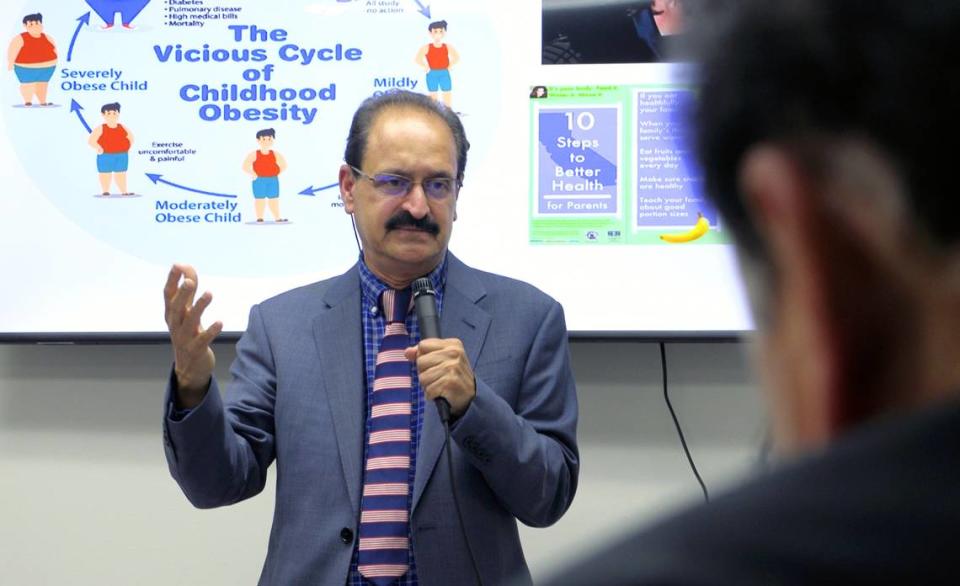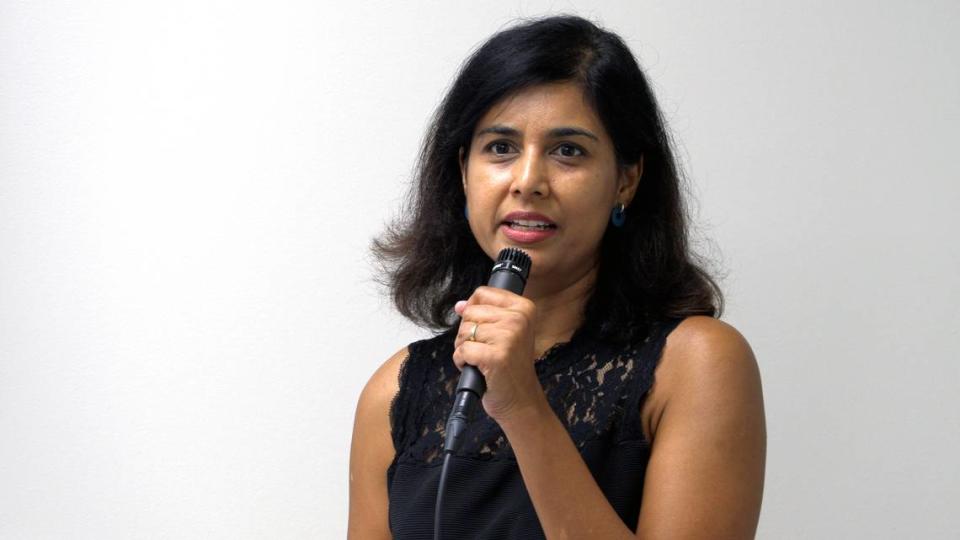New weight management clinic in Columbus wants to help patients with ‘diabesity’
Dr. Bantwal Baliga, an endocrinologist, and his wife, Dr. Prathibha Baliga who specializes in family medicine, lay in bed up late talking.
This is a common occurrence for the couple, Bantwal said, and the conversations often center around the care of their Columbus patients. During the discussion, the issue of weight loss arose. Bantwal had an idea.
“Why don’t we open a weight loss clinic here in Columbus?” he proposed.
He expected Prathibha to ignore the idea or say no. Instead, she said yes.
With his spouse on board, Bantwal approached his “work wife”, Dr. Mallika Thiruppathi, with the idea. Thiruppathi has always been passionate about weight loss, he said, because maintaining a healthy weight means people are healthier.
“She leads by example,” Bantwal said. “At 5 o’clock she’s done (working) and goes to the gym, whereas I go and eat my cookies!”

Led by Bantwal, the three doctors got to work opening the clinic.
The Chattahoochee Institute for Wellness, Longevity and Weight Management will begin seeing patients in August to holistically help Muscogee County residents struggling with their weight and diabetes.
“Diabesity” and people of color
While the number of Americans diagnosed with diabetes decreased from 9.3 per 1,000 adults in 2009 to 5.9 per 1,000 in 2019, according to the Centers for Disease Control, diabetes remains more common among Native American, Black, Asian and Hispanic people.
Approximately 46% of Columbus residents are African American, almost 8% are Hispanic and about 2.6% are Asian, according to the United States Census Bureau.
Between 2016 and 2020, ischemic heart and vascular disease was the leading cause of death in Muscogee County, according to Piedmont’s Community Health Need Assessment, and diabetes was the seventh leading cause.
Society is getting more inactive, Bantwal said, as cheap food made it easier for people to gain weight.
The term, ‘diabesity’ was originally coined by Dr. Francine Kaufman, who was invited to speak at the weight management clinic’s grand opening on July 14.
“We have to redefine how we live our lives,” Kaufman said during her speech. “How do we get that physical activity? How do we get the right foods in our daily life?”

A holistic approach
Bantwal has offices in Columbus and Opelika, and Athens.
When patients come to visit him, he said it’s often too late.
Obesity is not solely dependent on the decisions of an individual, Kaufman said. Weight gain can also depend on socioeconomic status and genetics. Some people get too busy taking care of other priorities they sacrifice their own health, Bantwal said.
“The last thing in the world we want to do is blame the patient — blame the person,” Kaufman said. “It’s not about that. Boy, if we could change our genes, I’d be Einstein.”
People who are overweight are more likely to have diabetes, cancers or have accidents like falling.
Anyone overweight is a good candidate for receiving treatment at the new clinic, Bantwal said, and he encourages those who are just crossing the line from normal to overweight because it’s easier for them to manage their weight at that time.
The clinic treats people with a holistic approach, he said.
“It’s not the weight,” Bantwal said. “Weight is a number. We know that it’s cosmetic. But I want people to have a very active lifestyle.”
Machines will measure fat mass, bone mass and analyze how patients’ bodies burn calories to help develop individualized programs, he said.
Services the clinic provides include exercise, nutritional coaching, optimizing heart health and psychological consultation.
Screening for depression occurs in patients’ initial visits, Bantwal said, and if needed they will be referred to a local psychologist and psychiatrist. The clinic will partner with a psychiatry team based in Peachtree City that provides cognitive behavioral therapy.
“(Mental health) is one of the things that usually gets neglected,” Bantwal said.
When patients visit his regular clinic, he said, they are usually so busy checking other things that there isn’t much time to spend on the obesity-related issue.
“Here, it’s going to be only focused on you,” Bantwal said. “You get more time with me or my other providers.”
The first rule of medicine
The program will focus first on exercise and lifestyle modification, Bantwal said. Then patients might be prescribed an insulin sensitizer used to treat diabetes called Metformin.
“It’s not a big weight loss pill,” he said. “But it brings down your insulin resistance. Then when you do everything else, it works better.”
Most people can safely take metformin with no issue, he said, but some patients can’t take it because of side effects or other underlying medical problems.
Other oral medications the clinic might prescribe include Orlistat, a weight loss medication used for people who also have high blood pressure, diabetes or heart disease. There are also drugs to control cravings like Qsymia or Contrave.
“Cravings are the killer for diabetes and obesity because you eat your meal, you go to bed and you’re craving sweetness,” he said. “That’s why we reach for the refrigerator and bring the scope of ice cream.”
If oral medications aren’t effective, then Bantwal would consider injectable drugs such as Wegovy, Saxenda or Mounjaro.
The clinic takes a measured approach to prescribing medicine, Bantwal said, starting with lifestyle changes and oral drugs before trying something more expensive.
What patients are prescribed also depends on what insurance companies are willing to pay for, he said. Insurance companies have been reluctant to cover newer, higher priced weight loss drugs, Bantwal said, but the clinic will do its best to help get treatments approved.
Part of this strategy is to gradually step up the treatment plan, he said, making companies more likely to approve it. But the clinic won’t prescribe medication people will be unable to afford, Bantwal said.
“If you cannot afford medication, don’t lose hope because we can help you,” he said. “Even without medication, it’s possible. But you have to work hard.”
Bantwal is also careful prescribing injections because recent guidance from the U.S. Food & Drug Administration warns about side effects, he said. While Ozempic has been in clinical trials for over a decade, the compound used for weight loss hasn’t had the same amount of studies.
The use of these medications have to be taken under the supervision of a good doctor who can keep an eye on symptoms, Bantwal said.
“In medicine they say the first rule of medicine is keep the patient safe,” he said. “Do no harm.”

